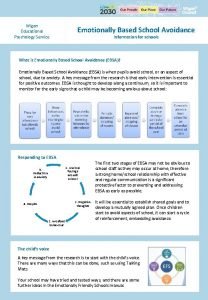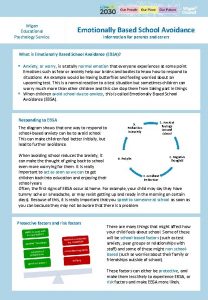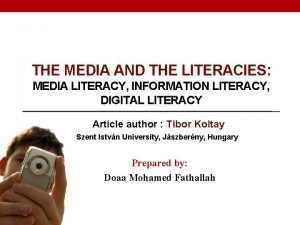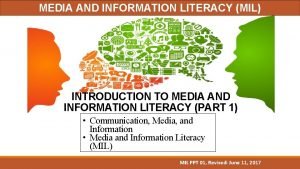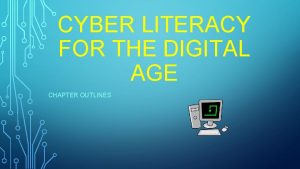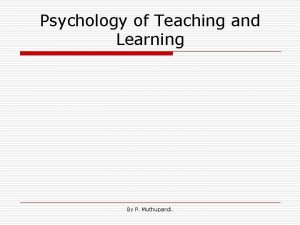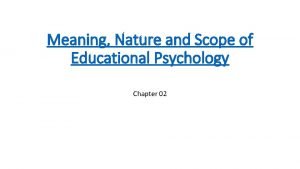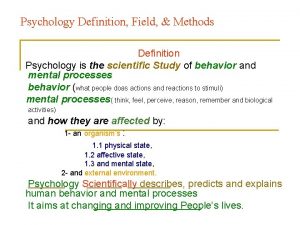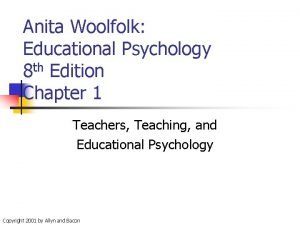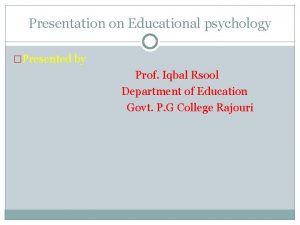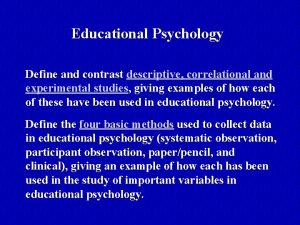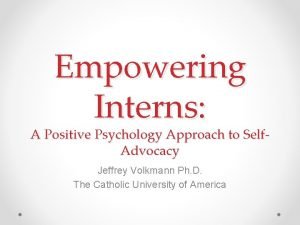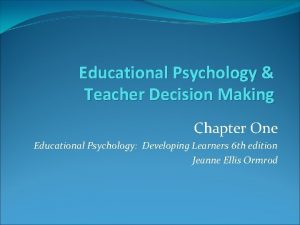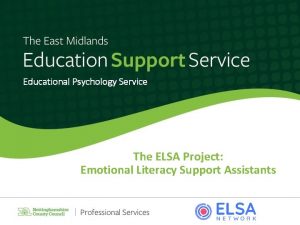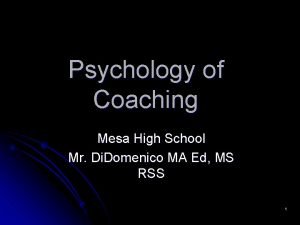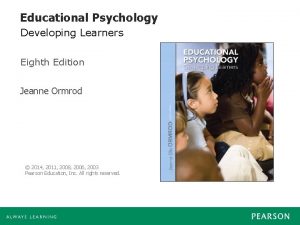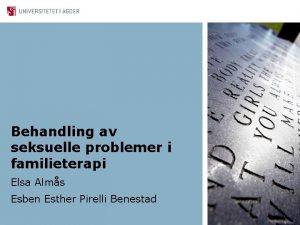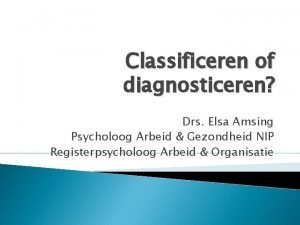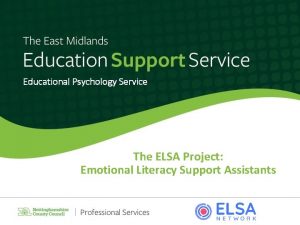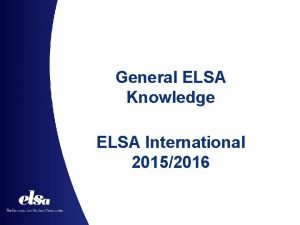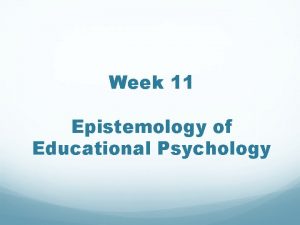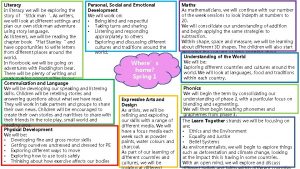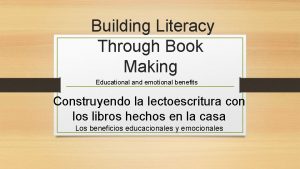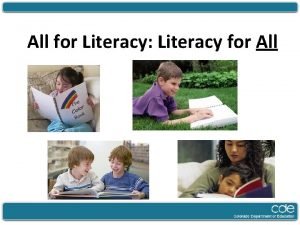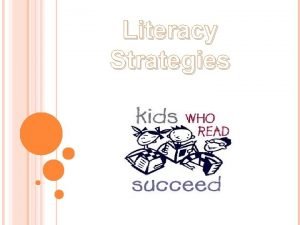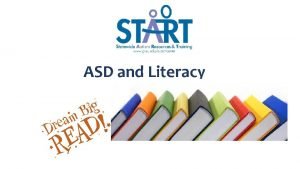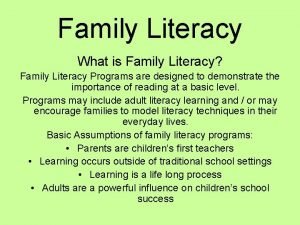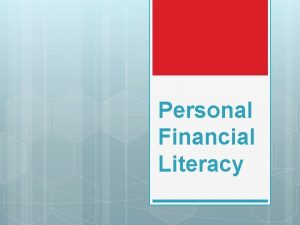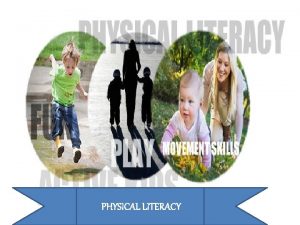Educational Psychology Service The ELSA Project Emotional Literacy



































- Slides: 35

Educational Psychology Service The ELSA Project: Emotional Literacy Support Assistants

What is an ELSA? • ELSAs are Emotional Literacy Support Assistants working in schools. • ELSAs help children recognise, understand manage emotions to increase success. • ELSAs plan and deliver individual (and small group) support programmes. • ELSAs receive training and supervision from educational psychologists.

Where does ELSA come from? Sheila Burton Educational Psychologist

www. elsanetwork. org

www. elsa-support. co. uk


Where does ELSA come from? • Peripatetic ELSAs working for Psychology Service (Southampton) • School-based ELSAs given training and supervision by Educational Psychology Service (Hampshire) • School-based model adopted in other local authorities (Northumberland – North Yorkshire – Nottinghamshire)

Where is ELSA being used? Anglesey Blackburn with Darwen Bolton Bournemouth Bracknell Forest Bridgend Buckinghamshire Cardiff Carmarthen Cheshire West & Chester Conwy Cornwall Croydon Darlington Denbighshire Doncaster Dorset Devon East Riding of Yorkshire Gwent Gwynedd Hammersmith and Fulham Hampshire Hertfordshire Hong Kong Hounslow Hull Isle of Wight Jersey Kensington and Chelsea Kingston Lambeth Leicestershire Lincolnshire Merthyr Tydfil Merton Monmouthshire Neath - Port Talbot Newport Norfolk North Somerset Northumberland Vale of Glamorgan North Yorkshire Waltham Forest Nottingham City Wandsworth Nottinghamshire West Berkshire Oxfordshire Westminster Pembrokeshire Windsor and Maidenhead Plymouth Wiltshire Poole Wolverhampton Portsmouth York Powys Redcar and Cleveland Rhondda Cynon Taff Richmond Service Children’s Education (Germany, Cyprus, Naples, Brunei, Falklands) Somerset Southampton South Gloucestershire South Tyneside Southwark Surrey Sutton

ELSA In Nottinghamshire • Lead by Educational Psychology Service • Pilot ELSA project in autumn term 2015, Mansfield • 180 ELSAs now trained across Nottinghamshire • New ELSA training course Spring 2019

ELSA Training Day 1: Introduction to Emotional Literacy Active Listening Skills, Using Circles Day 2: Self Esteem and Resilience Belonging and Friendship Day 3: Managing Strong Emotions Therapeutic Stories Day 4: Social Communication / Autism Spectrum Condition Day 5: Loss and Bereavement ELSA Programme Planning

ELSA Supervision • Group supervision every half-term facilitated by an educational psychologist • ‘Clinical’ supervision (not managerial) • Problem-solving approaches modelled e. g. Solution Circles • Peer group support e. g. sharing ideas/resources

EPS Involvement • Deliver 5 days training to develop ELSA skills • Advise on planning programmes of support • Provide group supervision (sometimes individual support) • Share useful published resources • Assist in dissemination of ‘home-grown’ resources and ideas, and in problem-solving general ELSA issues

What is Emotional Literacy? Claude Steiner (1997) psychotherapist ‘To be emotionally literate is to be able to handle emotions in a way that improves your personal power and improves the quality of life around you. ’ ‘Emotional literacy improves relationships, creates loving possibilities between people, makes co-operative work possible, and facilitates the feeling of community. ’

What is Emotional Literacy? 5 Key Elements: 1. Knowing your feelings 2. Having a sense of empathy 3. Learning to manage our emotions 4. Repairing emotional problems 5. Putting it all together: emotional interactivity

What is Mental Health? ‘ a state of well-being in which every individual realizes his or her own potential, can cope with the normal stresses of life, can work productively and fruitfully, and is able to make a contribution to her or his community. ’ ‘not merely the absence of disease or infirmity’ World Health Organisation (2001, 2004)

Youth Mental Health Difficulties UK • 1 in 10 children aged 5 -16 suffer from a diagnosable mental health disorder (2005, 2008) • 50% of mental health problems are established by age 14 (2005) www. youngminds. org. uk www. mentalhealth. org

Schools Promoting Positive Mental Health • Mental Health and Behaviour in Schools (2016) https: //www. gov. uk/government/uploads/system/uploads/attachment_data/fi le/508847/Mental_Health_and_Behaviour_-_advice_for_Schools_160316. pdf • Ofsted School Inspection Handbook (2016) https: //www. gov. uk/government/uploads/system/uploads/attachment_data/fi le/553942/School_inspection_handbook-section_5. pdf

ELSAs’ Evaluations ‘Thank you most sincerely for delivering an amazing training programme. ’ ‘I'm feeling so inspired by the training and fuelled to make the difference. ’ ‘Nice to have time to plan with others and having the EP on hand for questions. ’

What are the Benefits for Pupils? • Pupils feel very supported by having ‘special time’ and being listened to • Pupils develop greater self-awareness • Pupils learn to talk about difficulties • Pupils develop coping strategies • Pupils interact more successfully with others • Pupils feel better about themselves • Pupils manage better in school http: //www. elsanetwork. org/files/ELSA%20 evaluation%20 report%20 July%202009. pdf

What are the Benefits for School? • Access to prompt support for pupils in need • Positive changes in pupils with behavioural, emotional or social difficulties • Improved learning for target pupils and their peers • New skills/ideas cascaded to other staff • Increased confidence in managing ‘problems’ from within http: //www. elsanetwork. org/files/ELSA%20 evaluation%20 report%20 July%202009. pdf

What are the benefits for the ELSA The ELSA Gratitude Jar… …the role allows me to support others and hopefully improve their lives”. …the opportunities being an ELSA has given me. I have worked with some children who have made great progress and it has opened up a whole new direction for my job”. …making a difference to school life”. …to have had the opportunity to develop my own skills”. …to being able to make a difference to individual children emotionally”. …being chosen to be an ELSA has made me feel valued and has given me confidence. The staff and students think of me as a stable, calm person and this means a lot to me”. …having the time and confidence to be able to make a difference in children’s lives”.

UK-wide ELSA Research • ELSA’s felt more confident and more able to meet children’s emotional needs after completing the training course (Leighton, 2015) • Improvement in self-efficacy beliefs for ELSAs and children (Grahamslaw, 2010) • Head Teachers report • overall positive impact on students’ behaviour, emotional wellbeing and improved relationships • Individual level impact on attendance, reduction in bullying, academic achievement (Bournemouth EPS, 2009) • Notts EPS and University of Nottingham Research – Holly Haigh TEP

ELSA: Good Practice Guidelines and Getting Started

Allocation of Time

Work Space

Resources

Identifying Pupils


Session Planning

Target Setting


Parental Support

Whole School Support

In Conclusion: The ELSA Project is: • a partnership between the Educational Psychology Service and schools • a tried and tested means of building capacity in schools • an inexpensive way of providing quality support to vulnerable children

Questions? elsa@nottscc. gov. uk
 Emotionally based school avoidance
Emotionally based school avoidance Emotionally based school avoidance
Emotionally based school avoidance What is emotional literacy
What is emotional literacy Media literacy and information literacy similarities
Media literacy and information literacy similarities Memes about media and information literacy
Memes about media and information literacy How was mr nestor punzalan affected by being wrongfully
How was mr nestor punzalan affected by being wrongfully Cyber literacy for the digital age
Cyber literacy for the digital age Kolesnik psychologist
Kolesnik psychologist What are the scope of educational psychology
What are the scope of educational psychology Field psychology definition
Field psychology definition Educational psychology chapter 1
Educational psychology chapter 1 Woolfolk educational psychology
Woolfolk educational psychology Conclusion of educational psychology
Conclusion of educational psychology Define educational psychology
Define educational psychology Conclusion of educational psychology
Conclusion of educational psychology Discuss briefly the nature of educational psychology
Discuss briefly the nature of educational psychology Educational psychology
Educational psychology Educational psychology
Educational psychology Cie
Cie Educational sport psychology specialists
Educational sport psychology specialists Ormrod educational psychology
Ormrod educational psychology Elsa hysa
Elsa hysa Elsa lambda calculus
Elsa lambda calculus Cs 421 programming languages and compilers
Cs 421 programming languages and compilers Elsa gunter
Elsa gunter Elsa
Elsa Liceo scientifico volta colle
Liceo scientifico volta colle Helmi saksholm
Helmi saksholm Icm elsa
Icm elsa Elsa
Elsa Elsa moot court competition
Elsa moot court competition Elsa batista
Elsa batista Elsa amsing
Elsa amsing Elsa kassardjian
Elsa kassardjian Frank paats
Frank paats Elsa negre dauphine
Elsa negre dauphine
